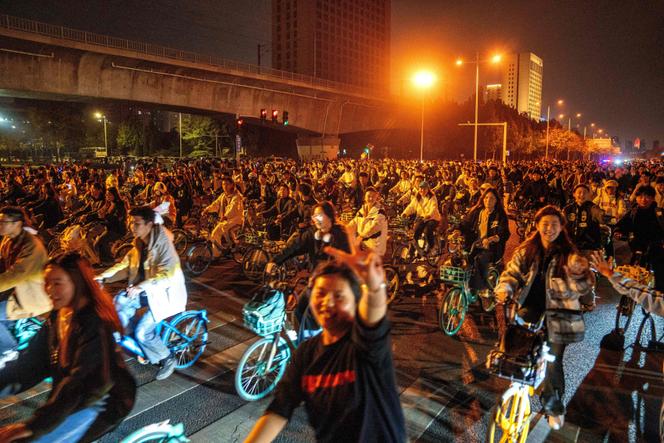


They are young and carefree, sounding the bell or crying out in joy, on their little yellow, blue or green bikes. Around midnight on Friday, November 8, tens of thousands of students rode from Zhengzhou, the capital of China's central Henan province, to Kaifeng, a historic city some 50 kilometers to the east. The objective? Nothing in particular, apart from an evening ride, ravioli soup on arrival – a Kaifeng specialty – and the excitement of sharing an experience with thousands of other young people.
Estimates suggest that over 100,000 youths took part in the procession that evening. This was probably the last time: faced with the scale of the phenomenon, authorities in both cities intervened the following day to ban the movement. They closed the roads to "non-motorized two-wheelers," bike-sharing platforms created "no-go" zones, locking bikes remotely, while some Zhengzhou universities restricted student outings off campus.
The trend seems to have started last summer, when four female college students posted on social networks about their cycling trip to Kaifeng to taste guan tang bao, the famous ravioli. Their spontaneity was emulated, inspiring other young people to publish their journeys under keywords celebrating the freedom of youth. In China, the power of social media can easily move hundreds of thousands of people. This is what happened on November 8. The day before, the very official People's Daily was still celebrating "a symbol of youthful energy and the joy of shared experiences, bringing life to the streets of Henan."
Delighted to receive so many visitors, many of whom were spending the weekend in the city, authorities in Kaifeng had deployed agents to secure certain roads, guide students and open tourist sites earlier in the morning. But the phenomenon overtook them: thousands of bikes left in a heap, traffic jams and garbage left by these tourists fed the discontent of local residents, according to a municipal publication.
Beyond the snowball effect of social media, the students' enthusiasm for this transhumance illustrates the enthusiasm of young Chinese for collective events. Barely two years after the end of the Covid zero strategy, young people are showing a particular interest in gatherings, which have been relatively rare in recent years in China, where authorities are wary of crowds. Festivals are few and far between, while censorship limits cultural offerings.
You have 24.03% of this article left to read. The rest is for subscribers only.
